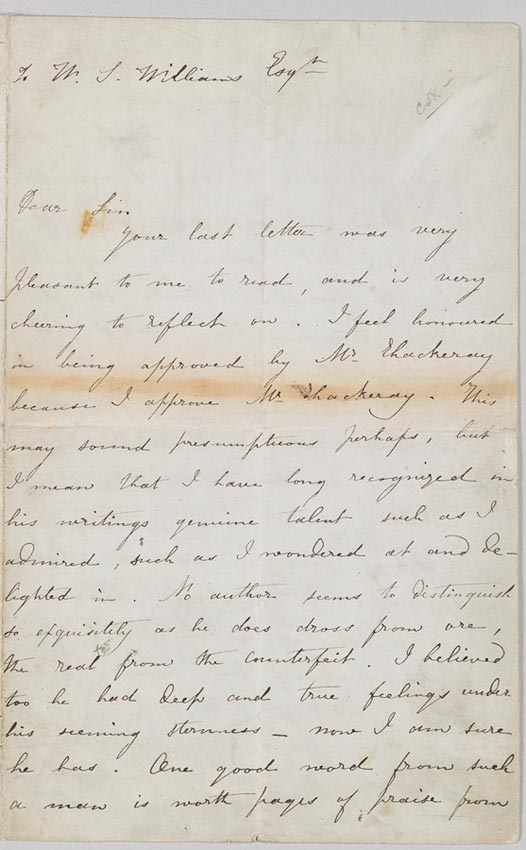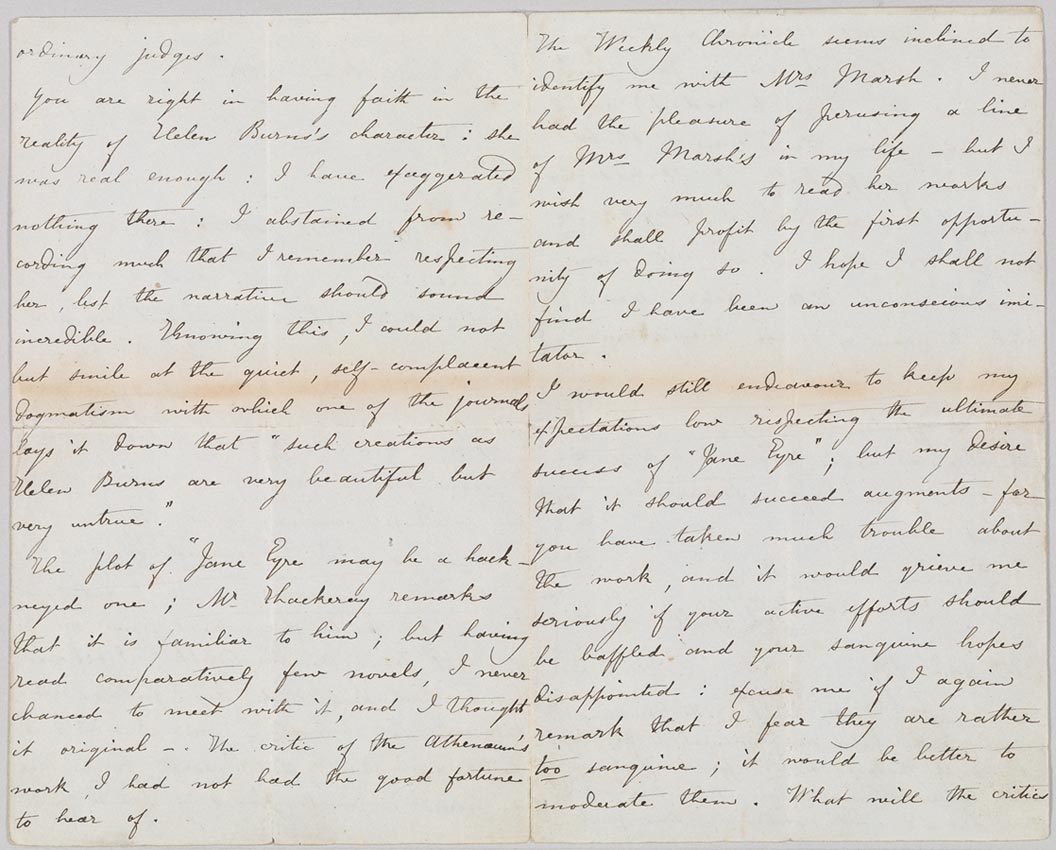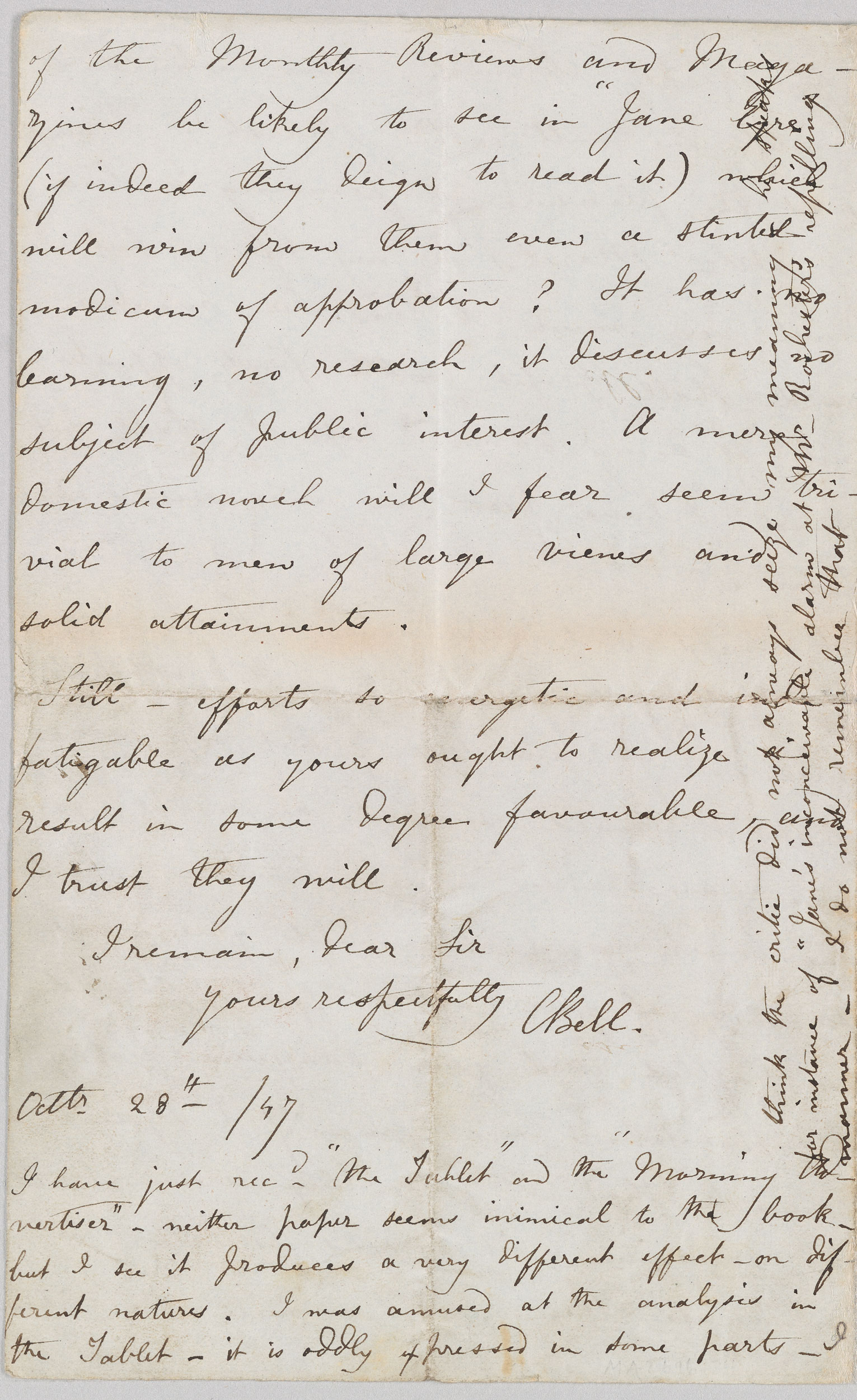1. Letter to William S. Williams, 28 October 1847, page 1

Letter to William S. Williams of Smith, Elder & Co., dated Haworth, 28 October 1847
Henry H. Bonnell Collection, bequest of Helen Safford Bonnell, 1969
In this letter to William S. Williams of the firm that had published Jane Eyre, Brontë reacted to some of the early reviews of her first published novel. She defended her portrayal of Helen Burns, a virtuous child who dies in Jane’s arms. Helen was, Brontë implied, a fictional reimagining of her own sister Maria, who had died at the age of eleven after falling ill at the Clergy Daughters’ School.
Dear Sir
Your last letter was very pleasant to me to read, and is very cheering to reflect on. I feel honoured in being approved by Mr Thackeray because I approve Mr Thackeray. This may sound presumptuous perhaps, but I mean that I have long recognized in his writings genuine talent such as I admired, such as I wondered at and delighted in. No author seems to distinguish so exquisitely as he does dross from ore, the real from the counterfeit. I believed too he had deep and true feelings under his seeming sternness – now I am sure he has. One good word from such a man is worth pages of praise from
Letter to William S. Williams, 28 October 1847, pages 2–3

Letter to William S. Williams of Smith, Elder & Co., dated Haworth, 28 October 1847
Henry H. Bonnell Collection, bequest of Helen Safford Bonnell, 1969
In this letter to William S. Williams of the firm that had published Jane Eyre, Brontë reacted to some of the early reviews of her first published novel. She defended her portrayal of Helen Burns, a virtuous child who dies in Jane’s arms. Helen was, Brontë implied, a fictional reimagining of her own sister Maria, who had died at the age of eleven after falling ill at the Clergy Daughters’ School.
ordinary judges.
You are right in having faith in the reality of Helen Burns’s character: she was real enough: I have exaggerated nothing there: I abstained from recording much that I remember respecting her, lest the narrative should sound incredible. Knowing this, I could not but smile at the quiet, self-complacent dogmatism with which one of the journals lays it down that “such creations as Helen Bums are very beautiful but very untrue.”
The plot of “Jane Eyre[”] may be a hackneyed one; Mr. Thackeray remarks that it is familiar to him; but having read comparatively few novels, I never chanced to meet with it, and I thought it original –. The critic of the Athenaeum’s work, I had not had the good fortune to hear of.
The Weekly Chronicle seems inclined to identify me with Mrs Marsh. I never had the pleasure of perusing a line of Mrs Marsh’s in my life – but I wish very much to read her works and shall profit by the first opportunity of doing so. I hope I shall not find I have been an unconscious imitator.
I would still endeavour to keep my expectations low respecting the ultimate success of “Jane Eyre”; but my desire that it should succeed augments – for you have taken much trouble about the work, and it would grieve me seriously if your active efforts should be baffled and your sanguine hopes disappointed: excuse me if I again remark that I fear they are rather too sanguine; it would be better to moderate them. What will the critics
Letter to William S. Williams, 28 October 1847, page 4

Letter to William S. Williams of Smith, Elder & Co., dated Haworth, 28 October 1847
Henry H. Bonnell Collection, bequest of Helen Safford Bonnell, 1969
In this letter to William S. Williams of the firm that had published Jane Eyre, Brontë reacted to some of the early reviews of her first published novel. She defended her portrayal of Helen Burns, a virtuous child who dies in Jane’s arms. Helen was, Brontë implied, a fictional reimagining of her own sister Maria, who had died at the age of eleven after falling ill at the Clergy Daughters’ School.
of the Monthly Reviews and Magazines be likely to see in “Jane Eyre” (if indeed they deign to read it) which will win from them even a stinted modicum of approbation? It has no learning, no research, it discusses no subject of public interest. A mere domestic novel will I fear seem trivial to men of large views and solid attainments.
Still – efforts so energetic and indefatigable as yours ought to realize a result in some degree favourable, and I trust they will.
I remain, dear Sir
Yours respectfully
C Bell.
Octbr 28th / 47
I have just recd. “the Tablet” and the “Morning Advertiser” – neither paper seems inimical to the book – but I see it produces a very different effect – on different natures. I was amused at the analysis in the Tablet – it is oddly expressed in some parts – I think the critic did not always seize my meaning – he speaks for instance of “Jane’s inconceivable alarm at Mr. Rochester’s repelling manner – I do not remember that